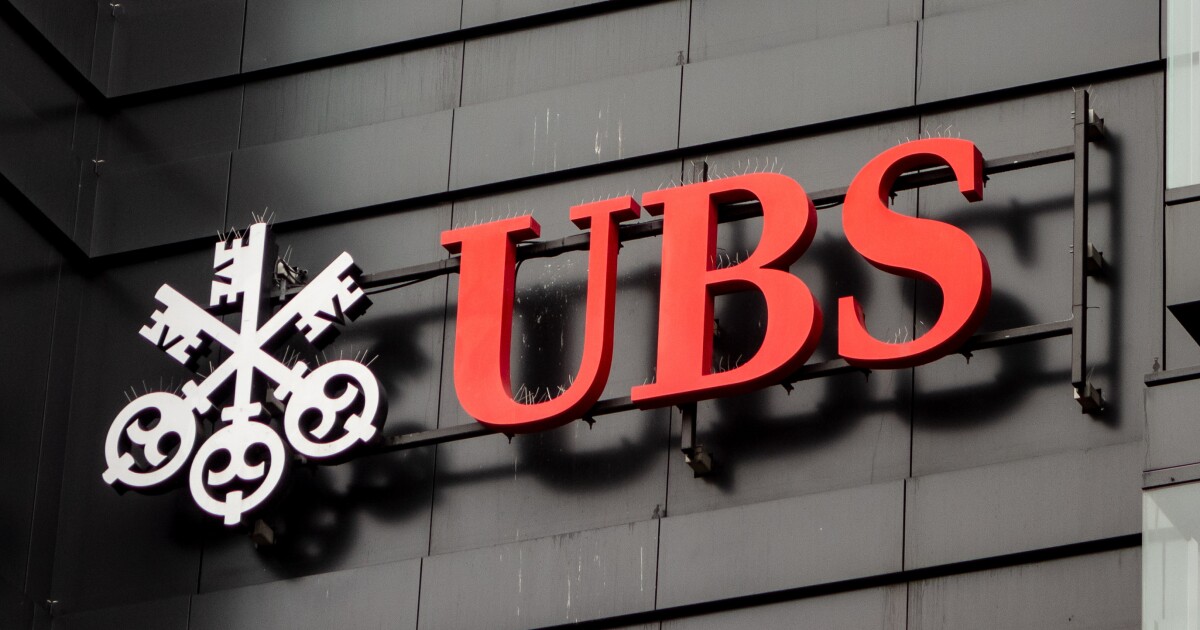It’s not only the number of UBS advisors who jumped to industry rivals this year that is remarkable, but also the huge asset tallies those advisors had under management.
And then there’s the fact that most of the departing UBS advisors aren’t running away from a wirehouse setting. In fact, Wall Street rivals like Morgan Stanley have been among the biggest beneficiaries from the recent wave of UBS defections.
So finds a paper released Tuesday by the recruiting firm Diamond Consultants. In its “UBS Advisor Transition Report,” Diamond Consultants found that 169 advisors left UBS in the first half of 2025. Even if that pace falls in the second half, the departure rate is still on track to outstrip previous years. UBS lost 156 advisors in all of 2024, 168 in 2023 and 214 in 2022, according to Diamond Consultants.
But UBS’ troubles go beyond a declining headcount, according to the report.
“It’s the size and quality of the departing teams that is even more noteworthy,” according to Diamond Consultants. “By our count 16 teams with over $500 [million] in AUM and 8 with over $1B in AUM left the firm in the first half of the year.”
Pay changes last year, and return to status quo this year
Even UBS executives have acknowledged that the firm would most likely see an increase in departures this year following changes to advisor compensation announced in late 2024. In general, the new policy reduced the percentage of revenue generated for the firm that advisors get to keep for themselves, while also providing greater incentives to bring in assets and work with wealthy clients.
Last month, UBS announced further revisions to its compensation policies designed in large part to roll back the least popular parts of the previous changes, while giving advisors yet more of a nudge toward high net worth clientele. Jason Diamond, the president of Diamond Consultants and primary author of the report on UBS, said in an interview Tuesday that he thinks the recent update will make little difference in the firm’s loss rate.
Diamond said many UBS advisors were no doubt prompted to look toward the exits by the earlier compensation changes. But that came on top of other causes for grievance, none of which is likely to go away anytime soon.
Like many employees of Wall Street wirehouses, UBS advisors can find themselves bogged down by bureaucratic delays in simple tasks like awaiting approval of marketing materials, Diamond said. On top of that, UBS’ drive to improve its margins has made the firm reluctant to set money aside for expenses such as adding support staff.
Some of the changes UBS made in late 2024 merely brought its compensation in line with pay policies found at the other wirehouses — Merrill, Morgan Stanley and Wells Fargo. For instance, UBS abandoned what it had called its Combined Team Grid, which had allowed wealth managers on advisory teams to be paid out a percentage of the group’s total production. Its replacement, the Highest Producer Grid, allows advisors on a team to receive payouts only as a percentage of the revenue generated by the highest-producing member.
Other wirehouses had long been doing the same, Diamond noted. He reemphasized that no single policy was behind the UBS advisor exodus.
“It’s the sum total of all this,” he said.
Drive for better profit margin and falling headcount
One of UBS’ main goals for its U.S. wealth management unit has been to raise the amount of revenue the division gets to keep after subtracting expenses. That percentage was just above 12% in the second quarter, up from just barely over 9% the year before. Still, it lags far behind the numbers posted by industry rivals like Morgan Stanley, which had a 28.3% operating margin in its second quarter.
A UBS spokesperson declined to comment on the Diamond report. In a memo circulated last month, UBS characterized its most recent compensation changes as being entirely beneficial for advisors.
“This year’s plan is a direct outcome of a truly collaborative and constructive dialogue with Advisors and Field Leaders and is designed to provide transparency and simplicity, as well as support the future growth and development of your businesses, our clients and our firm,” according to the memo.
UBS doesn’t provide advisor numbers solely for its U.S. market, but it ended its second quarter with 5,773 in its Americas unit, which also includes Canada and Latin America. That was 229 fewer advisors than in the second quarter of last year.
Ron Edde, another industry recruiter and the president and CEO of the recruiting firm Millennium Career Advisors, has kept his own tally of departing UBS advisors. By his count, nearly 200 have left so far this year. He agreed that UBS’ reversal of its pay cuts for many advisors is unlikely to have dissuaded anyone from departing.
That’s especially true, Edde said, if they’ve already gone so far as talking to recruiters and other firms.
“There’s no one I’ve been meeting with who has said, ‘Well, since they’ve done this, we’ve changed our minds and we’re going to stay put,'” Edde said.
$1B+ teams among the defectors
Diamond, who does not recruit for UBS, said there are probably some advisors who were on the fence about leaving and now have been persuaded by the most recent compensation changes to stay.
“But as a whole, we are seeing no impact from the revised policy,” Diamond said. “There’s not a diminished appetite for advisors to talk to other firms.”
Diamond Consultants’ report also notes a series of teams with AUM totals of $1 billion or more that have left for rival firms. They include Family Office Partners, a group with $2.5 billion under management that broke away from UBS in June to affiliate itself with the independent firm Elevation Point. Also noted in the Diamond Consultants’ report were:
Morgan Stanley, RBC, Wells Fargo magnets for departing advisors
Jason Diamond said the report’s numbers don’t include everyone who shows up in industry registration records as having moved from UBS to a competitor. Diamond Consultants tracks only advisors with three or more years of experience. That helps exclude trainees and other industry newcomers who are unlikely to be responsible for large AUM tallies.
The report also only looks at employees with the word “advisor” or something similar in their titles. That’s to help exclude those who have secured brokerage licenses but don’t work directly with clients.
Of the firms that have benefited the most from the departures, Morgan Stanley came out on top, with nearly 50 advisors recruited from UBS. Following it were RBC with 19, Raymond James and Wells Fargo with 18 each, and Rockefeller Financial with 11.
According to Diamond Consultants’ report, the departures to Morgan Stanley suggest the UBS advisors who are leaving aren’t necessarily seeking to escape a wirehouse setting: “Morgan Stanley clearly offers clients stability and a known entity, and for advisors who like the wirehouse world but are discontented with UBS’ direction, Morgan Stanley represents a very compelling alternative.”
UBS growing increasingly litigious
UBS has shown itself more and more willing to go to court to contest departing advisors’ right to take clients and their assets with them to rival firms. That’s particularly true in cases in which advisors inherited parts of their books of business from older colleagues who were expecting to keep receiving income from their former clients following retirement.
Last month, UBS sued four advisors with $1.4 billion under management who had left not even two weeks before to start their own firm, Loxahatchee Capital in Tequesta, Florida. And on Monday, federal judge Susan DeClercq for the Southern District of Michigan approved UBS’ request for a temporary restraining order against a six-person team that had managed $1.1 billion for UBS in the Detroit suburb of Bloomfield Hills, Michigan, before leaving for RBC Wealth Management. The order bars the group, led by Jonathan Modiano, Adam Jones and Mark Steinberg, from using UBS’ proprietary information to try to solicit clients until the dispute can be resolved by a Financial Industry Regulatory Authority arbitration panel.
Both suits concern UBS’ Aspiring Legacy Financial Advisor, or ALFA, program, which provides retiring advisors with a means of passing their books of business down to younger colleagues. According to the suit, advisors who signed up to take on clients through the ALFA program agreed to various nonsolicitation provisions barring them from trying to move those accounts over to other firms.
Thomas Lewis of the law firm Stevens & Lee, who is representing the group in the Michigan-based lawsuit, said in a statement: “The advisors have done nothing wrong and have complied with their obligations. The advisors look forward to defending themselves and opposing UBS’ allegations.”
Recruiting down, but also reasons for hope
Diamond Consultants noted in its report that departures aren’t the only cause for concern at UBS. The firm has also been struggling with recruiting over the past year.
UBS added only 37 advisors in the first half of 2025. Coupled with its departures in the same period, that gave it a net headcount loss of 122.
“Theyr are going to have turn that around, unless the goal is to have a wealth management unit that’s half the size it is now but is maybe more profitable and say: We’re OK with that,” Jason Diamond said.
The Diamond Consultants report finds that all is not lost for UBS. It notes that its wirehouse rival Merrill has managed to recover from its own unpopular changes made to its pay grid a few years ago; and Wells Fargo has been recuperating from a series of scandals that had cast a shadow over the entire firm for a number of years.
The report lists UBS’ attributes as: “1.) A world-class brand associated with excellence and the UHNW space, 2.) a strong investment bank and capital markets platform, and 3.) some of the largest and most productive advisors in the industry.
“All that said,” it adds, “the next 6-12 months will prove to be absolutely critical in the history of UBS.”


























